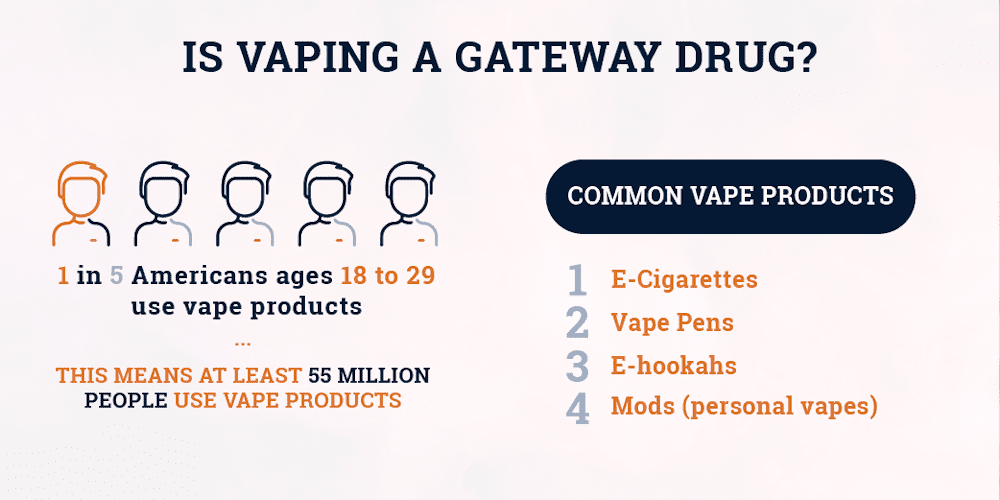With the growing popularity of vaping, people may wonder about the risks of this practice. Many people may be unfamiliar with exactly what vaping is and how it works. Maybe you’ve heard about vaping as a “safe” alternative to smoking. However, it’s critical to question just how “safe” it is and if it is a gateway drug. Northern Illinois Recovery Center can give you some guidance in exploring this issue.
What Is Vaping and How Does It Work?
 Vaping is defined as “the action or practice of inhaling and exhaling the vapor produced by an electronic cigarette or similar device.” People use a variety of devices to achieve vaping. Some of these include:
Vaping is defined as “the action or practice of inhaling and exhaling the vapor produced by an electronic cigarette or similar device.” People use a variety of devices to achieve vaping. Some of these include:
- E-cigarettes
- Vape pens
- E-hookahs
- MODS, which are personal vapors
All of these vaping products have an e-liquid placed in them. The person then inhales the aerosol produced and exhales it. The vaping liquid does not contain tobacco, which is why they are promoted as being safer than cigarettes.
What Is in Vaping Liquid?
As stated above, the vaping liquid doesn’t contain tobacco, which is how they have gained such traction on the market as a means to quit smoking cigarettes. However, they do contain nicotine, which is addictive. Furthermore, many of the off-market e-cigarettes will contain tetrahydrocannabinol (THC). This ingredient is the same one that is in marijuana, thus leading to another problem. Other ingredients in vaping liquid include flavorings and water.
Vaping comes with serious health consequences for those who use it. The nicotine alone raises your blood pressure, causes your adrenaline to spike, and increases the chances of you having a heart attack. Even though you’re not inhaling smoke, you are taking in chemicals that scientists don’t know much about yet. Not enough research has been conducted to know all the long-term effects. However, there are alarming reports of deaths linked to vaping and e-cigarette use in the news.
Can Vaping Be a Gateway Drug?
When considering whether vaping can be a gateway drug, especially within the context of addiction treatment at our drug rehab illinois, it’s important to understand a gateway drug’s meaning. A gateway drug is a substance that may or may not be addictive, but it can lead to other, more addictive drugs. A gateway drug can also be considered as a “soft” (or legal) drug that leads to “harder” (illegal or more dangerous) drugs. Alcohol is an example of a gateway substance because although it is legal and not considered a “hard” drug, it can lead people to other more dangerous substances.
Vaping meets the criteria above to be classified as a gateway drug. It does have addictive chemicals within, namely nicotine. Also, because of the easy access to THC-formulated vaping liquid, it can lead to harder drugs.

Find Help for Vaping at Northern Illinois Recovery Center
If you are struggling to overcome the use of vaping or another form of smoking but don’t see a way out, then seeking treatment will help you do it safely. Trying to turn to another substance like vaping may have detrimental consequences on your health. Also, it can lead to additional drug use.
Through specialized therapy programs, you can move forward in life without the need for these substances. With the help of the Northern Illinois Recovery Center by your side, you can find the pathway to a sober life. You may benefit from an intensive outpatient treatment program or a sober living treatment program. At Northern Illinois Recovery Center, we offer a wide range of services to meet our clients on their journey to health.
Don’t let vaping and other substances take hold of your success in life. You can overcome the vices of these substances by seeking the proper treatment by participating in an addiction treatment program. Contact Northern Illinois Recovery Center at 855.786.1978, and we’ll be there every step of the way.




